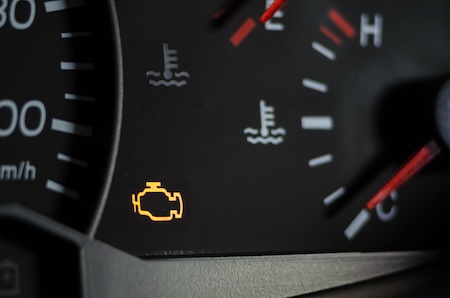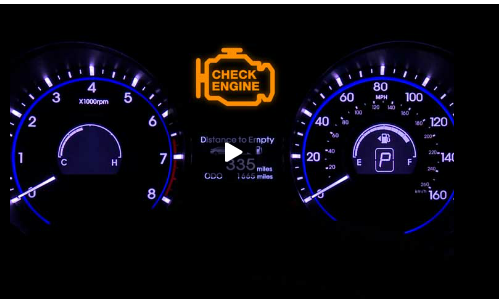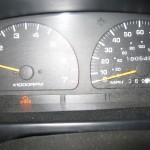You’re cruising down I-25 or pulling into your favorite coffee shop when you see it—the amber engine icon lighting up your dashboard. Again.
The check engine light is one of the most misunderstood warning lights in your vehicle. It doesn’t always mean disaster, but it’s never something you should ignore.
This little light is your car’s way of waving a red (well, yellow) flag. Something’s wrong, and your engine control unit (ECU) is letting you know. Whether it’s minor or major, acting fast can keep your vehicle running smoothly and safely.
Why It Keeps Coming On: Common Causes
The check engine light is tied to your car’s On-Board Diagnostics (OBD-II) system. When your car detects an issue affecting engine performance or emissions, it triggers a code—and the light.
Wouldn’t it be nice if it was one light, one cause? Unfortunately, that’s not the case. Some dashboard lights are narrower in focus, and can lead you to a problem. The check engine light is linked to a host of potential problems:
Loose or Faulty Gas Cap
It sounds simple, but a loose or cracked gas cap can let fuel vapors escape, throwing off the emissions system. Before you panic, always check that your gas cap is tight and in good condition.
Worn Spark Plugs or Wires
If your engine is misfiring, it’s often due to bad spark plugs or ignition wires. This can lead to reduced fuel economy, sluggish performance, or rough idling.
Oxygen Sensor Failure
Your O2 sensor monitors unburned oxygen in the exhaust. If it fails, it can reduce fuel efficiency and increase emissions—and definitely trigger that light.
Catalytic Converter Issues
The catalytic converter helps reduce your vehicle’s emissions. If it becomes clogged or damaged, it can lead to poor performance and an illuminated check engine light.
Mass Airflow Sensor Malfunction
This sensor measures the amount of air entering your engine. If it fails, the engine may not run efficiently, resulting in poor fuel economy and performance.
Faulty Thermostat or EGR Valve
A stuck thermostat can cause overheating, and a faulty Exhaust Gas Recirculation (EGR) valve can lead to increased emissions. Both can cause the check engine light to turn on, and stay on.
Steady vs. Flashing: There’s a Difference
A steady check engine light is usually signaling a non-emergency issue, though it still requires diagnosis and repair.
But a flashing check engine light is more serious. It usually means a cylinder misfire, which can cause damage to critical components of your car’s engine if ignored. If your light is flashing, pull over when it’s safe and avoid driving until the problem is diagnosed.
What Should You Do When It Comes On?
You’re busy. And the check engine light doesn’t always come on at the most opportune time. Your instinct might be to ignore it and hope it goes away. But that’s not a good strategy.
Here’s a better approach:
- Check your gas cap. Tighten it and see if the light goes off after a few trips.
- Note performance issues. Any stalling, jerking, or rough idling should be mentioned to your mechanic.
- Don’t delay diagnosis. Even if your car seems fine, get it checked. Small problems can quickly become big repairs.
Can You Drive With the Check Engine Light On?
It depends on the issue.
If the light is steady and your car is running normally, it’s usually safe to drive a short distance. But don’t ignore it. Get it checked as soon as possible.
If the light is flashing, do not continue driving. This typically means a serious issue that could damage your engine or exhaust system. Have your vehicle towed to a trusted repair shop.
Why the Light Keeps Coming Back After You “Fix” It
Ever had the check engine light go off, only to return days later? There are a few reasons that happens:
- The problem wasn’t fully resolved. A temporary reset won’t fix a failing part.
- There are multiple codes. Fixing one issue doesn’t address other underlying problems.
- A sensor is still faulty. Sometimes sensors themselves malfunction, creating false warnings.
It’s always smart to work with a local mechanic who takes time to identify and fix the root cause, not just clear the code.
How We Diagnose It
At our Denver shop, we don’t just plug in a scanner and send you on your way. We take the time to:
- Read the trouble codes
- Inspect affected components
- Evaluate related systems
- Explain the issue in plain English
- Offer repair options that work with your budget and schedule
Because let’s be honest, nobody likes surprises when it comes to car repairs. Our goal is to keep you informed, confident, and back on the road safely.
Why It Matters in Denver
Ever see someone pulled over to the side of the road and thought: I’m glad that’s not me. What prevents that is good maintenance routines. Because Denver’s elevation, weather swings, and traffic congestion make your car even more susceptible to issues. It’s even more important to stay on top of engine health.
- Altitude affects how your engine burns fuel, which can cause issues with O2 sensors and airflow sensors.
- Cold starts in winter increase stress on your ignition and fuel system.
- Stop-and-go traffic can wear down engine components faster, especially if you do a lot of short trips.
Ignoring a check engine light in these conditions? That’s a recipe for bigger problems. Like engine failure, emissions test failures, or even a breakdown as you’re cruising up I-70 for a day of skiing.
Trust Your Dashboard—and Your Local Mechanic
Your check engine light isn’t something to be feared. It’s a communication tool—your car’s way of saying, “Something’s off. Please look into it.”
You don’t have to figure it out on your own. That’s what we’re here for.
Whether the light has been glowing for days or just popped on this morning, we’ll help you find the answer and take the right next step. No scare tactics, just honest advice.
Don’t Ignore the Light—Let’s Check It Out
You rely on your car every day. Don’t let a small issue turn into a major headache.
We care about your car and will help you get to the bottom of why your check engine light is on through diagnostics and repair. We’ll help you decode the mystery and fix the problem, so you can drive with confidence. No warning lights required.
Think that light might mean trouble? Stop by or schedule an appointment today.



 When your check engine light comes on, you may be torn between utter panic and just wanting to ignore it and hope it goes away. That’s perfectly understandable. That same check engine light could come on for anything from a serious engine or transmission problem all the way down to a loose gas cap.
When your check engine light comes on, you may be torn between utter panic and just wanting to ignore it and hope it goes away. That’s perfectly understandable. That same check engine light could come on for anything from a serious engine or transmission problem all the way down to a loose gas cap.
 A question we often hear at our shop is “why is my check engine light flashing?” There is not always a simple and quick answer to this question.
A question we often hear at our shop is “why is my check engine light flashing?” There is not always a simple and quick answer to this question.